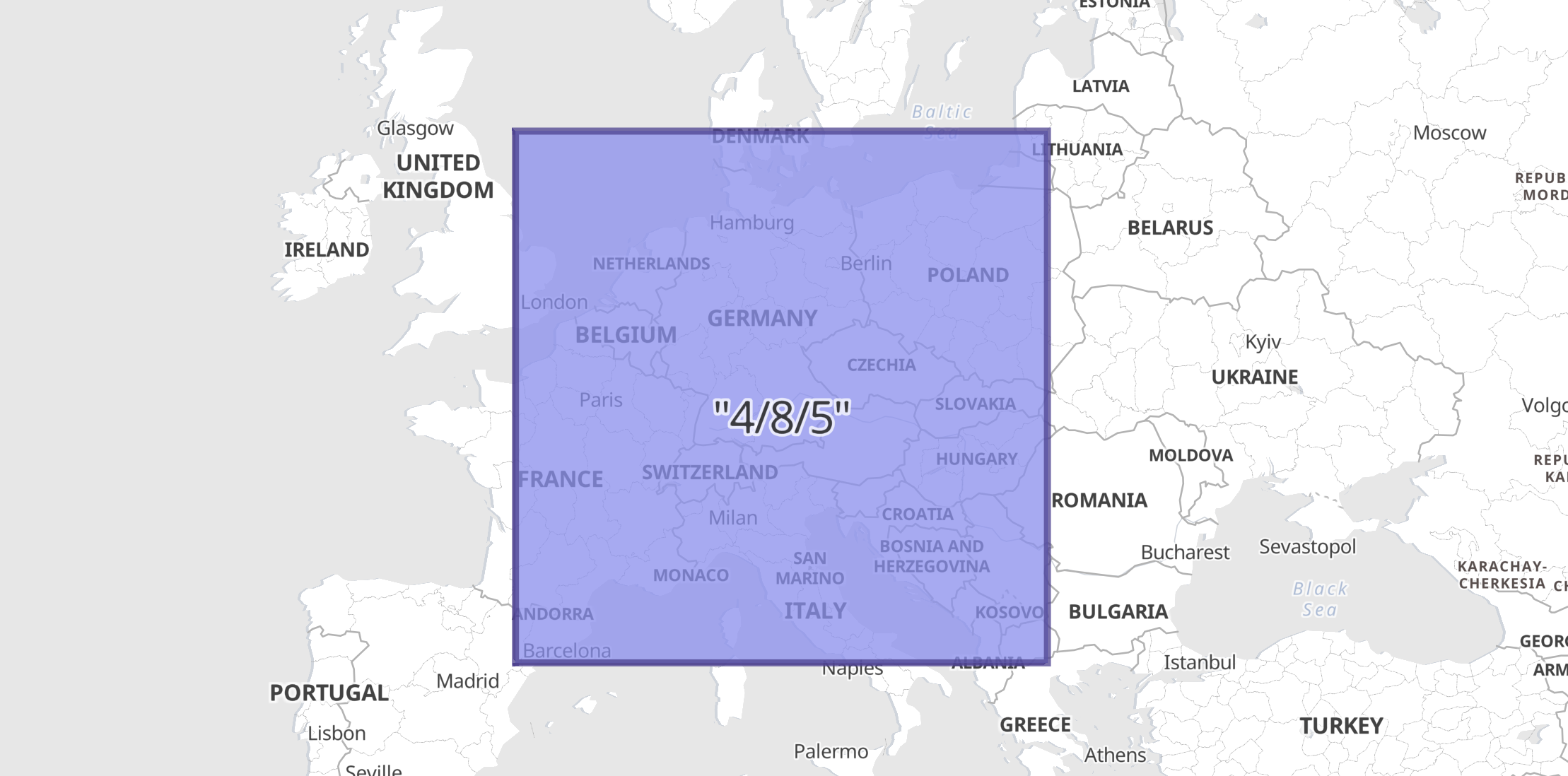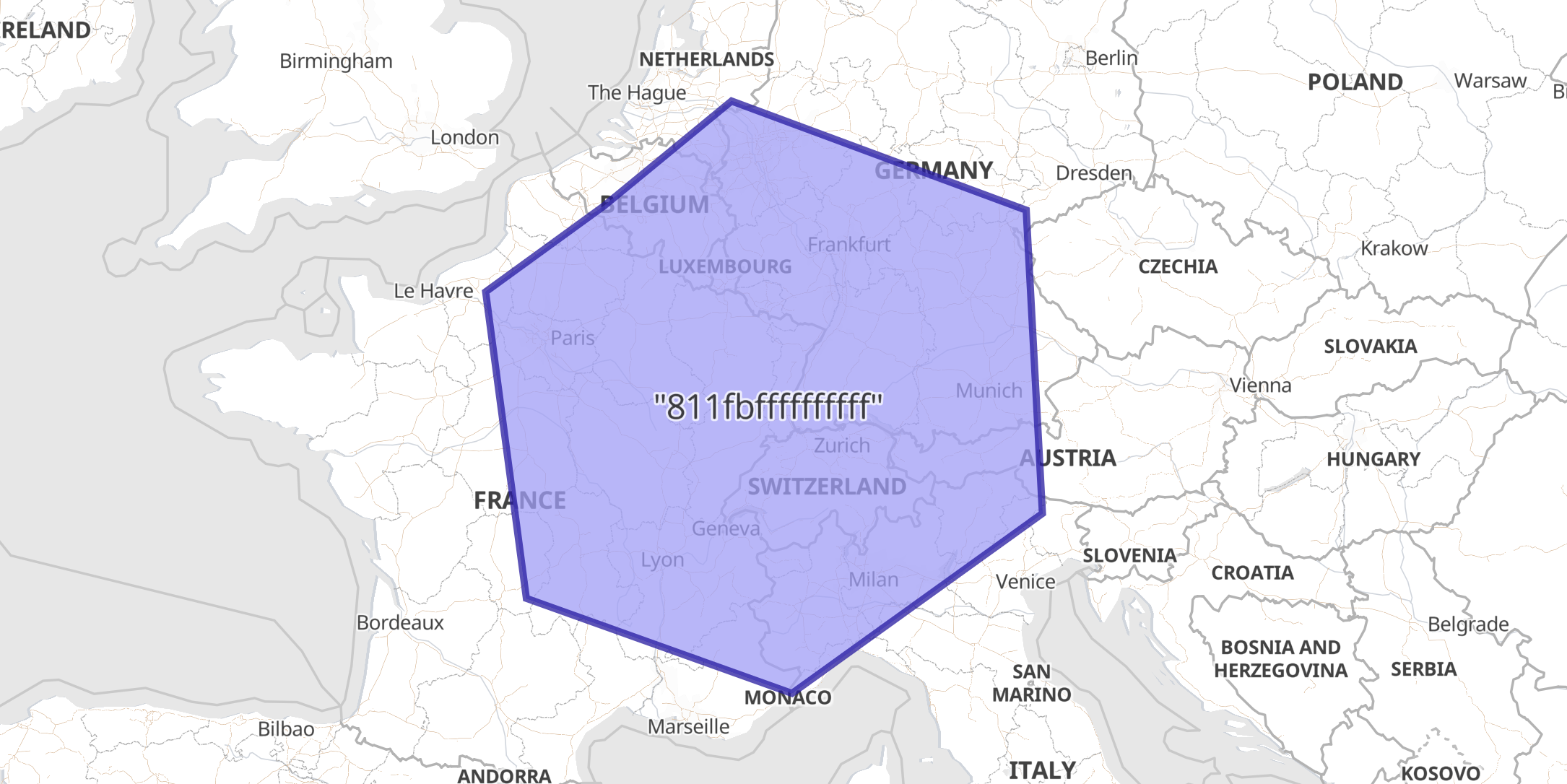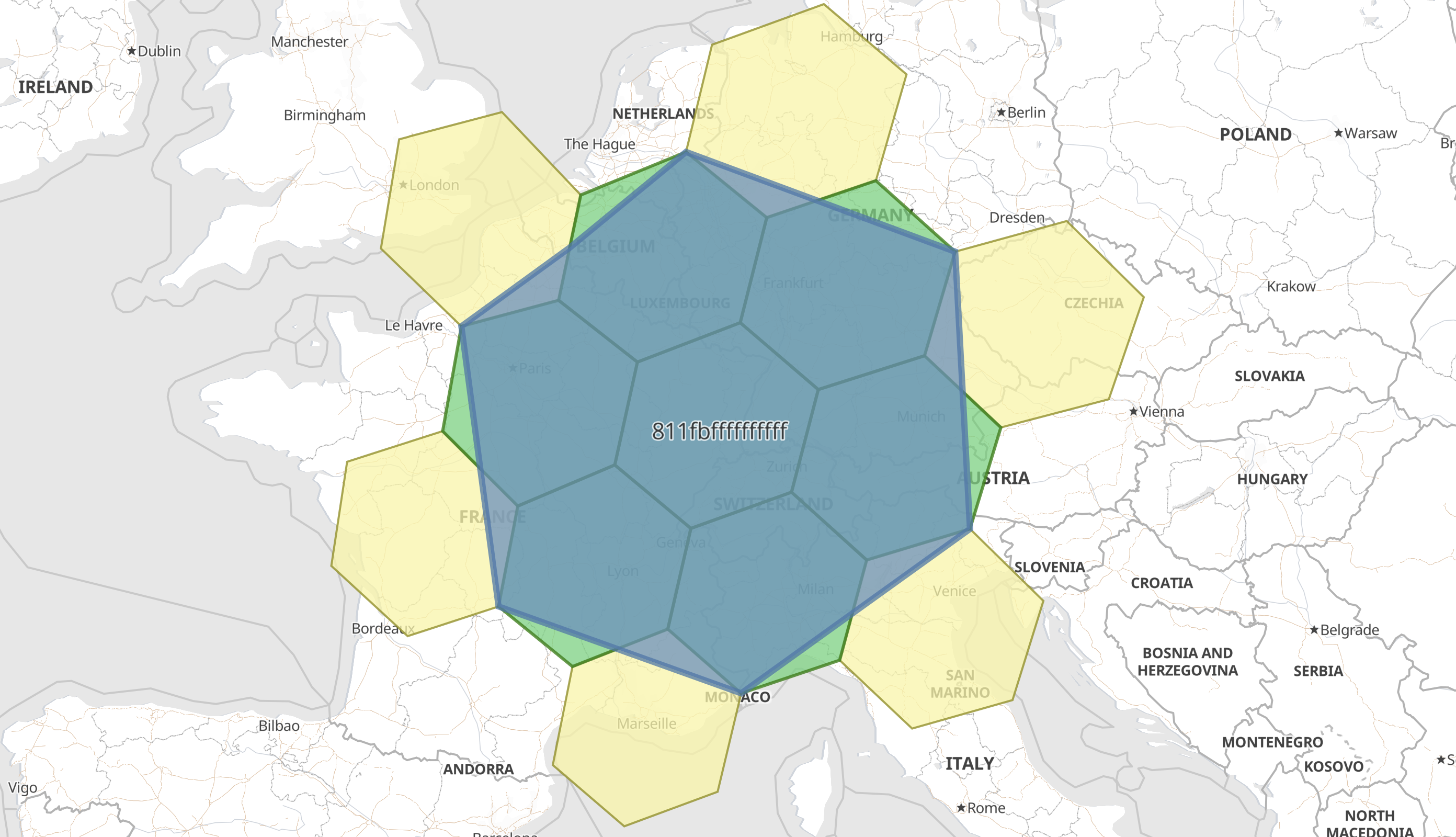地理网格处理器
编辑地理网格处理器
编辑将网格图块或单元格的地理网格定义转换为描述其形状的常规边界框或多边形。如果需要将图块形状作为可空间索引的字段进行交互,这将非常有用。例如,geotile 字段值 "4/8/3" 可以索引为字符串字段,但这不会启用任何空间操作。相反,将其转换为值 "POLYGON ((0.0 40.979898069620134, 22.5 40.979898069620134, 22.5 55.77657301866769, 0.0 55.77657301866769, 0.0 40.979898069620134))",该值可以索引为 geo_shape 字段。
表 21. geo_grid 处理器选项
| 名称 | 必填 | 默认值 | 描述 |
|---|---|---|---|
|
是 |
- |
要解释为地理图块的字段。字段格式由 |
|
是 |
- |
理解三种图块格式: |
|
否 |
|
要为其分配多边形形状的字段,默认情况下, |
|
否 |
- |
如果指定且存在父图块,则将该图块地址保存到此字段。 |
|
否 |
- |
如果指定且存在子图块,则将其图块地址保存到此字段作为字符串数组。 |
|
否 |
- |
如果指定且存在相交的非子图块,则将其地址保存到此字段作为字符串数组。 |
|
否 |
- |
如果指定,则将图块精度(缩放级别)作为整数保存到此字段。 |
|
否 |
- |
如果 |
|
否 |
"GeoJSON" |
保存生成的图形的格式。 |
|
否 |
- |
处理器的描述。用于描述处理器的用途或其配置。 |
|
否 |
- |
有条件地执行处理器。请参阅 有条件地运行处理器。 |
|
否 |
|
忽略处理器的错误。请参阅 处理管道错误。 |
|
否 |
- |
处理处理器的错误。请参阅 处理管道错误。 |
|
否 |
- |
处理器的标识符。用于调试和指标。 |
为了演示此摄取处理器的用法,请考虑一个名为 geocells 的索引,该索引为类型为 geo_shape 的字段 geocell 进行了映射。为了使用 geotile 和 geohex 字段填充该索引,请定义两个摄取处理器
resp = client.indices.create(
index="geocells",
mappings={
"properties": {
"geocell": {
"type": "geo_shape"
}
}
},
)
print(resp)
resp1 = client.ingest.put_pipeline(
id="geotile2shape",
description="translate rectangular z/x/y geotile to bounding box",
processors=[
{
"geo_grid": {
"field": "geocell",
"tile_type": "geotile"
}
}
],
)
print(resp1)
resp2 = client.ingest.put_pipeline(
id="geohex2shape",
description="translate H3 cell to polygon",
processors=[
{
"geo_grid": {
"field": "geocell",
"tile_type": "geohex",
"target_format": "wkt"
}
}
],
)
print(resp2)
response = client.indices.create(
index: 'geocells',
body: {
mappings: {
properties: {
geocell: {
type: 'geo_shape'
}
}
}
}
)
puts response
response = client.ingest.put_pipeline(
id: 'geotile2shape',
body: {
description: 'translate rectangular z/x/y geotile to bounding box',
processors: [
{
geo_grid: {
field: 'geocell',
tile_type: 'geotile'
}
}
]
}
)
puts response
response = client.ingest.put_pipeline(
id: 'geohex2shape',
body: {
description: 'translate H3 cell to polygon',
processors: [
{
geo_grid: {
field: 'geocell',
tile_type: 'geohex',
target_format: 'wkt'
}
}
]
}
)
puts response
const response = await client.indices.create({
index: "geocells",
mappings: {
properties: {
geocell: {
type: "geo_shape",
},
},
},
});
console.log(response);
const response1 = await client.ingest.putPipeline({
id: "geotile2shape",
description: "translate rectangular z/x/y geotile to bounding box",
processors: [
{
geo_grid: {
field: "geocell",
tile_type: "geotile",
},
},
],
});
console.log(response1);
const response2 = await client.ingest.putPipeline({
id: "geohex2shape",
description: "translate H3 cell to polygon",
processors: [
{
geo_grid: {
field: "geocell",
tile_type: "geohex",
target_format: "wkt",
},
},
],
});
console.log(response2);
PUT geocells
{
"mappings": {
"properties": {
"geocell": {
"type": "geo_shape"
}
}
}
}
PUT _ingest/pipeline/geotile2shape
{
"description": "translate rectangular z/x/y geotile to bounding box",
"processors": [
{
"geo_grid": {
"field": "geocell",
"tile_type": "geotile"
}
}
]
}
PUT _ingest/pipeline/geohex2shape
{
"description": "translate H3 cell to polygon",
"processors": [
{
"geo_grid": {
"field": "geocell",
"tile_type": "geohex",
"target_format": "wkt"
}
}
]
}
这两个管道可用于将文档索引到 geocells 索引中。 geocell 字段将是矩形图块(格式为 z/x/y)或 H3 单元格地址的字符串版本,具体取决于我们索引文档时使用的摄取处理器。生成的几何图形将以 geo_shape 字段的形式表示并索引,格式为 GeoJSON 或 Well-Known Text。
示例:GeoJSON 中带有信封的矩形地理图块
编辑在此示例中,由于上面的摄取处理器定义了默认的 target_format,因此以 z/x/y 格式定义值的 geocell 字段被索引为 GeoJSON 信封。
resp = client.index(
index="geocells",
id="1",
pipeline="geotile2shape",
document={
"geocell": "4/8/5"
},
)
print(resp)
resp1 = client.get(
index="geocells",
id="1",
)
print(resp1)
response = client.index(
index: 'geocells',
id: 1,
pipeline: 'geotile2shape',
body: {
geocell: '4/8/5'
}
)
puts response
response = client.get(
index: 'geocells',
id: 1
)
puts response
const response = await client.index({
index: "geocells",
id: 1,
pipeline: "geotile2shape",
document: {
geocell: "4/8/5",
},
});
console.log(response);
const response1 = await client.get({
index: "geocells",
id: 1,
});
console.log(response1);
PUT geocells/_doc/1?pipeline=geotile2shape
{
"geocell": "4/8/5"
}
GET geocells/_doc/1
响应显示摄取处理器如何将 geocell 字段替换为可索引的 geo_shape
{
"_index": "geocells",
"_id": "1",
"_version": 1,
"_seq_no": 0,
"_primary_term": 1,
"found": true,
"_source": {
"geocell": {
"type": "Envelope",
"coordinates": [
[ 0.0, 55.77657301866769 ],
[ 22.5, 40.979898069620134 ]
]
}
}
}

示例:WKT 格式中的六边形地理六边形和多边形
编辑在此示例中,由于此摄取处理器明确定义了 target_format,因此具有 H3 字符串地址的 geocell 字段被索引为 WKT 多边形。
resp = client.index(
index="geocells",
id="1",
pipeline="geohex2shape",
document={
"geocell": "811fbffffffffff"
},
)
print(resp)
resp1 = client.get(
index="geocells",
id="1",
)
print(resp1)
response = client.index(
index: 'geocells',
id: 1,
pipeline: 'geohex2shape',
body: {
geocell: '811fbffffffffff'
}
)
puts response
response = client.get(
index: 'geocells',
id: 1
)
puts response
const response = await client.index({
index: "geocells",
id: 1,
pipeline: "geohex2shape",
document: {
geocell: "811fbffffffffff",
},
});
console.log(response);
const response1 = await client.get({
index: "geocells",
id: 1,
});
console.log(response1);
PUT geocells/_doc/1?pipeline=geohex2shape
{
"geocell": "811fbffffffffff"
}
GET geocells/_doc/1
响应显示摄取处理器如何将 geocell 字段替换为可索引的 geo_shape
{
"_index": "geocells",
"_id": "1",
"_version": 1,
"_seq_no": 0,
"_primary_term": 1,
"found": true,
"_source": {
"geocell": "POLYGON ((1.1885095294564962 49.470279179513454, 2.0265689212828875 45.18424864858389, 7.509948452934623 43.786609335802495, 12.6773177459836 46.40695743262768, 12.345747342333198 50.55427505169064, 6.259687012061477 51.964770150370896, 3.6300085578113794 50.610463307239115, 1.1885095294564962 49.470279179513454))"
}
}

示例:丰富的图块详细信息
编辑如 geo_grid 处理器选项 中所述,可以设置许多其他字段,这些字段将丰富可用信息。例如,对于 H3 图块,有 7 个子图块,但只有第一个完全包含在父图块中。其余六个仅与父图块部分重叠,并且存在另外六个与父图块重叠的非子图块。这可以通过向摄取处理器添加父级和子级附加字段来调查
resp = client.ingest.put_pipeline(
id="geohex2shape",
description="translate H3 cell to polygon with enriched fields",
processors=[
{
"geo_grid": {
"description": "Ingest H3 cells like '811fbffffffffff' and create polygons",
"field": "geocell",
"tile_type": "geohex",
"target_format": "wkt",
"target_field": "shape",
"parent_field": "parent",
"children_field": "children",
"non_children_field": "nonChildren",
"precision_field": "precision"
}
}
],
)
print(resp)
response = client.ingest.put_pipeline(
id: 'geohex2shape',
body: {
description: 'translate H3 cell to polygon with enriched fields',
processors: [
{
geo_grid: {
description: "Ingest H3 cells like '811fbffffffffff' and create polygons",
field: 'geocell',
tile_type: 'geohex',
target_format: 'wkt',
target_field: 'shape',
parent_field: 'parent',
children_field: 'children',
non_children_field: 'nonChildren',
precision_field: 'precision'
}
}
]
}
)
puts response
const response = await client.ingest.putPipeline({
id: "geohex2shape",
description: "translate H3 cell to polygon with enriched fields",
processors: [
{
geo_grid: {
description:
"Ingest H3 cells like '811fbffffffffff' and create polygons",
field: "geocell",
tile_type: "geohex",
target_format: "wkt",
target_field: "shape",
parent_field: "parent",
children_field: "children",
non_children_field: "nonChildren",
precision_field: "precision",
},
},
],
});
console.log(response);
PUT _ingest/pipeline/geohex2shape
{
"description": "translate H3 cell to polygon with enriched fields",
"processors": [
{
"geo_grid": {
"description": "Ingest H3 cells like '811fbffffffffff' and create polygons",
"field": "geocell",
"tile_type": "geohex",
"target_format": "wkt",
"target_field": "shape",
"parent_field": "parent",
"children_field": "children",
"non_children_field": "nonChildren",
"precision_field": "precision"
}
}
]
}
索引文档以查看不同的结果
resp = client.index(
index="geocells",
id="1",
pipeline="geohex2shape",
document={
"geocell": "811fbffffffffff"
},
)
print(resp)
resp1 = client.get(
index="geocells",
id="1",
)
print(resp1)
response = client.index(
index: 'geocells',
id: 1,
pipeline: 'geohex2shape',
body: {
geocell: '811fbffffffffff'
}
)
puts response
response = client.get(
index: 'geocells',
id: 1
)
puts response
const response = await client.index({
index: "geocells",
id: 1,
pipeline: "geohex2shape",
document: {
geocell: "811fbffffffffff",
},
});
console.log(response);
const response1 = await client.get({
index: "geocells",
id: 1,
});
console.log(response1);
PUT geocells/_doc/1?pipeline=geohex2shape
{
"geocell": "811fbffffffffff"
}
GET geocells/_doc/1
此索引请求的响应
{
"_index": "geocells",
"_id": "1",
"_version": 1,
"_seq_no": 0,
"_primary_term": 1,
"found": true,
"_source": {
"parent": "801ffffffffffff",
"geocell": "811fbffffffffff",
"precision": 1,
"shape": "POLYGON ((1.1885095294564962 49.470279179513454, 2.0265689212828875 45.18424864858389, 7.509948452934623 43.786609335802495, 12.6773177459836 46.40695743262768, 12.345747342333198 50.55427505169064, 6.259687012061477 51.964770150370896, 3.6300085578113794 50.610463307239115, 1.1885095294564962 49.470279179513454))",
"children": [
"821f87fffffffff",
"821f8ffffffffff",
"821f97fffffffff",
"821f9ffffffffff",
"821fa7fffffffff",
"821faffffffffff",
"821fb7fffffffff"
],
"nonChildren": [
"821ea7fffffffff",
"82186ffffffffff",
"82396ffffffffff",
"821f17fffffffff",
"821e37fffffffff",
"82194ffffffffff"
]
}
}
然后,此附加信息将使您能够例如创建 H3 单元格、其子代及其相交的非子代单元格的可视化。
